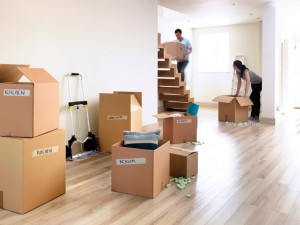4-6 Weeks Before Your Move
- Start packing – time goes quickly!

- Get your hands on some sturdy cardboard boxes. Try and get a variety of sizes. A lot of smaller boxes will mean lighter boxes once you’ve filled them. You’ll also need bubble wrap, tape, markers and paper (you can buy clean white butcher’s paper at some storage places. Don’t use newspaper as it soils items).
- Confirm settlement date with your conveyancer/lawyer/real estate agent so you can set a moving date.
- Book a removal company or rental truck. Establish your budget, obtain a written quote and establish moving transit insurance.
- Create a folder for all your moving documents.
- Complete a floor plan of your new home for furniture placement and measure the spaces to ensure your furniture willfit, particularly the fridge. Will large items fit through doors?
- Although tedious, it’s a good idea to prepare an inventory of everything you own, noting any scratches or dents. We recommend taking photos – it’s a lot easier!
- Make a note of any precious items that require special care to move.
- Have a thorough cleanout, including sorting through the garage and/or garden shed.
- Arrange a rubbish pick-up with the local Council.
- Pre-plan and schedule any necessary repairs required.
- Start to use the frozen and canned foods you’ve been storing and clear anything past its use-by date.
- Keep a list of incoming mail so you can start notifying businesses, colleagues and suppliers of your intended change of address. You’ll also need to arrange to have your mail held or redirected to your new address (www.auspost.com.au or visit an Australia Post retail outlet).
- Organise Contents and Household Insurance for your new home.
- Notify the Electoral Office and VicRoads of your new address.
- Research storage facilities if needed.
2-3 Weeks Before You Move
- Keep packing!
- List essential things you’ll need on moving day. We recommend putting together a ‘survival kit’ with necessary electrical appliances (kettle, microwave, toaster), breakfast requirements, a small tool kit for re-assembling items that couldn’t be moved whole, special children’s toys, school needs, pet requirements, bathroom necessities, medical bag (prescription drugs, pain killers, deep heat and bandaids), snacks, spare light globes, toilet paper and a change of clothes for everyone.
- Ensure your new home will be thoroughly cleaned (oven cleaned, carpet steam cleaned, etc.) before you move in and your current home cleaned after you move.
- Disassemble outdoor items and children’s play equipment.
- Contact the utilities you’ll require at your new residence.
Last Days
- Cancel local arrangements such as lawn mowing service, newspaper delivery, etc.
- Collect anything outstanding, such as lay-bys, dry-cleaning, shoe repairs, etc.
- Return things like library books, videos, etc.
- Defrost and clean your fridge and freezer. Have a portable Esky and ice to transport contents.
- Pack personal/sentimental items you’ll be carrying on you during the move
- Unplug and tie up appliance cords.
- If your house will be empty for a while, it’s often a good idea to inform police and neighbours.
On Moving Day
- Make sure you know exactly where your ‘survival kit’ is for
 the move.
the move. - Carry valuables, personal effects and important papers with you so they don’t go astray.
- Check that nothing has been left behind – don’t forget to check the tops of cupboards, garden area/shed and garage.
- Before you leave your old residence, make sure it’s securely locked and the gas meter and electricity switchboard are turned off.
- If you’re using removalists, provide them with floor plans and new address parking information.
- Ask removalists to load kitchen boxes last so they are first off the truck.
- Try to stand at the removalist’s entry point and give clear directions as to furniture placement.
Your New Home
No matter how organised you’ve been throughout the moving process, you will be exhausted by the end of the day! Here are a few extra tips and tricks to make sure your stress is kept to a minimum:
- Check all utilities are connected and hot water service is on.
- Notify moving company immediately if anything is missing.
- If possible, pre-cook a meal which can simply be heated up or just order take-away food!
- Make all the beds up earlier in the day. There’s nothing worse than finishing a long hard day of packing and unpacking then
remembering that the mattresses are still bare. - Contact your new local council for garbage collection information, etc.



